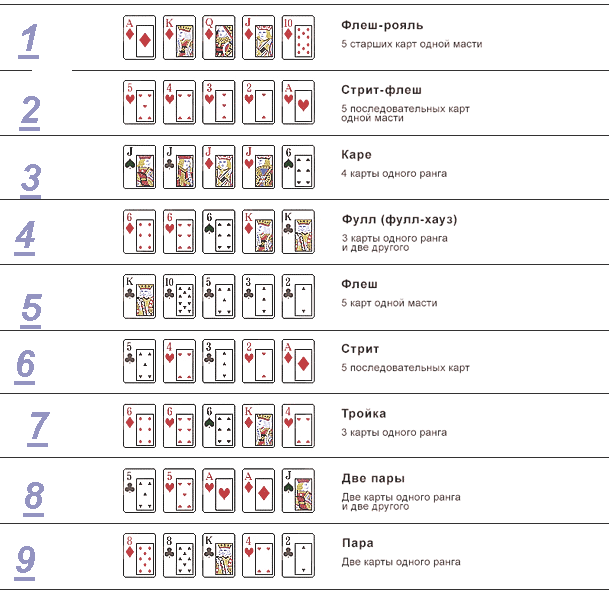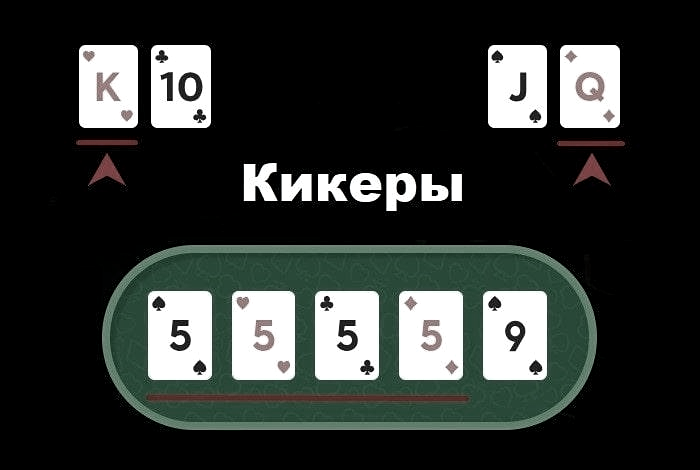A poker hand is a set of cards that a poker player compiles during a deal. The challenge for each player is to form the strongest hand that compares to the opponents' hands at showdown. And the older the combination, the higher the chances of winning - getting opponents' bets.
What combinations are there in poker?
Regardless of the discipline, all types of poker use the same combinations. Below is a table with all combinations in compliance with the hierarchy (from highest to lowest):

The table lists combinations that are arranged in decreasing order of precedence. Some poker room clients have tips that are displayed in real time. During the distribution, the screen displays the name of the strongest combination that the player has managed to collect at the moment.
Hand and combination - what are the differences?
In educational literature and commercials, "hand" and "combination" are often put in one synonymous row. But in reality, different definitions are hidden under the terms:
- A hand is a group of cards that is used at showdown to compare with the opponent's cards. In a game with community cards - Omaha, Hold'em, Stud - it is always 5-card. In this case, the hand may not contain a poker combination at all.
- A combination is a collection of cards of the same suit, of the same rank or in order, which have a certain strength, taking into account the rules of poker. It can consist of a different number of cards - 2, 3, 4 or 5.
A player can have a 2-card hand, but in the process of comparison with the opponent's combination, additional cards on his hands and on the board will be taken into account. Let's assume that:
- 3 ♥ and 9 ♦ - poker player's pocket cards;
- 3 ♦ K ♣ A ♣ 5 ♥ 2 ♠ - community cards on the board;
- 3 ♦ 3 ♥ - a combination made by the poker player.
During showdown, a player can only use a 5-card hand consisting of board cards and pocket cards. Ultimately, his hand will include 3 ♦ 3 ♥ K ♣ A ♣ 9 ♦.
Features of drawing up combinations in poker
Winning combinations are collected from community cards on the table and pockets - starting cards that are given preflop. Certain disciplines include:
- Starting cards exchange - in Draw poker;
- More Pockets Deal - 4 in Omaha.
In standard disciplines - Stud, Omaha and Hold'em - the final hand includes no more than 5 cards. This takes into account an important rule:
The starting and community cards make up the strongest 5-card hand. If the combination consists of 2, 3 or 4 cards, it is complemented by the cards of the board - the highest in rank.

Let's pretend that:
- Q ♣ J ♣ - player's starting cards;
- 10 ♦ J ♦ K ♣ A ♣ 6 ♣ - community cards of the board.
A player can make different combinations of 7 cards - a Pair of Jacks, a Straight from cards of diamonds and clubs, and a Flush. But the poker player will count only the strongest combination - K ♣ A ♣ 6 ♣ Q ♣ J ♣.
How to determine the seniority of a combination?
The principle of the seniority of poker combinations is clearly demonstrated in the table. But in the game, poker players often get hands of the same strength. For example, 2-3 participants at the table may have Threes or Pairs. The win is not always divided equally, because the seniority of additional cards is taken into account:
- Two Pairs - combinations are compared according to the rank of the highest pairs, if they are the same, then according to the lowest pairs. If both are the same, take into account the 5th card, which is called the Kicker.
- Full House - seniority is determined by the rank of cards from the Three. If they are equal, then the Pairs are compared.
- Flush, Straight and Steer-Flush - the strongest combination will be the one with the highest ranked card. For example, Straight 9 to K will lose to Straight 10 to A.
- Pair, Three of a Kind and Four of a Kind - the strongest is a combination of cards of the highest rank. For example, three of a kind on Jacks will lose to a three of a kind on Kings or Aces.
- Royal Flush is the only hand that never loses. If both get the same hands, then the pot is divided equally.
The stronger the poker hand in the game, the higher your chances of winning the total pot!


